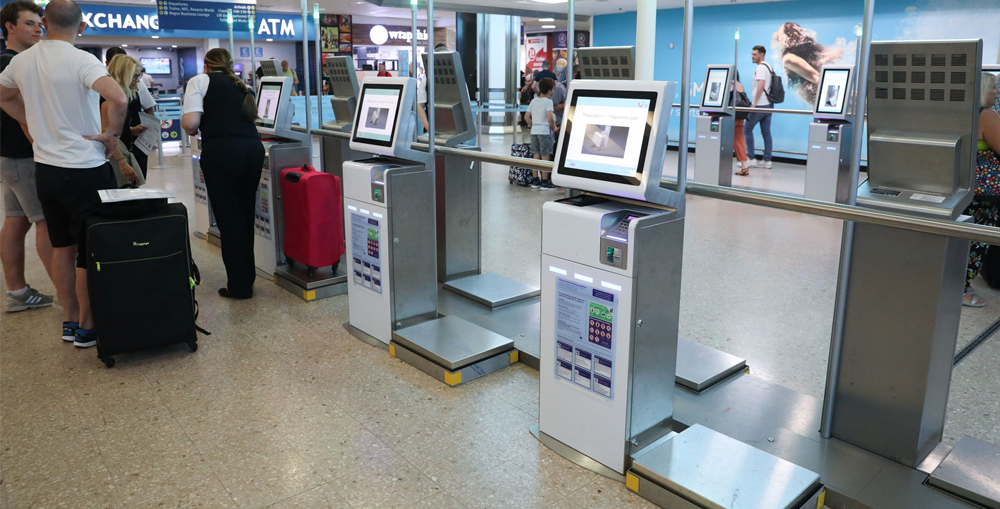 The airports of any country represent the country, its culture, ambitions, vision, and the society in its entirety. Every country in the world tries to have a first great impression of the visitors and also a comfortable and desirable experience for all passengers. The airlines and other business establishments also have certain needs and demands which the airport management must have to consider. The overall quality of services and the passenger experience varies from country to country, in fact it also varies from airport to airport within a same country. This is what makes a huge difference and it could either attract more passengers or it could repel them.
The airports of any country represent the country, its culture, ambitions, vision, and the society in its entirety. Every country in the world tries to have a first great impression of the visitors and also a comfortable and desirable experience for all passengers. The airlines and other business establishments also have certain needs and demands which the airport management must have to consider. The overall quality of services and the passenger experience varies from country to country, in fact it also varies from airport to airport within a same country. This is what makes a huge difference and it could either attract more passengers or it could repel them.
For any airport the first priority is its passenger, it has to ensure that all the passengers have a great and comforting experience at the airport. Moreover the airports offer additional services just to enhance the experience of the passengers. The airports in UAE are considered to be among the busiest airports in the world. Which means that the industry is already very mature. But it doesn’t mean that there is no space for innovation and modernization anymore.
See Also: The Role of Check-in Kiosks in Transforming Airport Experiences
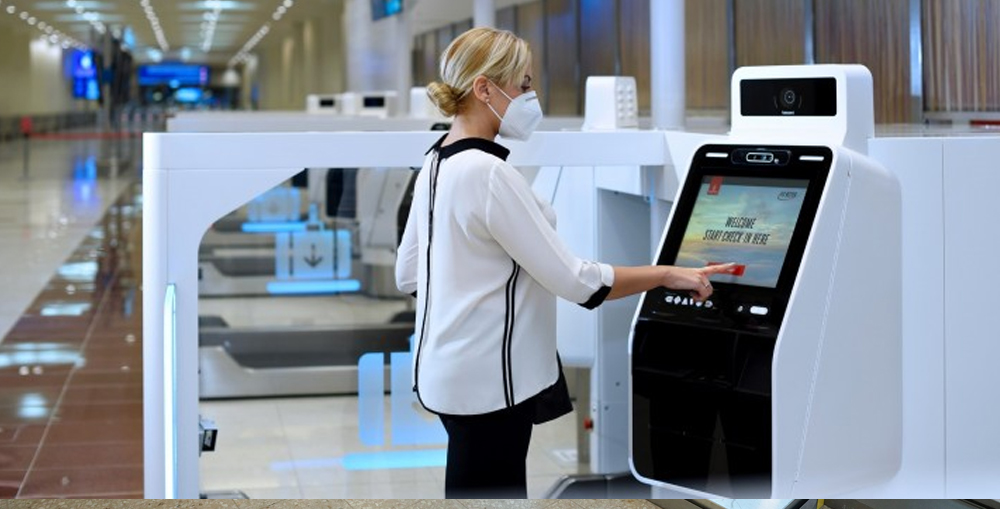
When it comes to the passengers, they compare an airport with the other airports they have visited. The airports all around the world are proactively improving their services and the user experience of the passengers. The world has become a global village now, the demand from the passengers and the trends are changing very quickly. That is why the airports and the operators all around the world are increasingly adopting to the digital solutions and technology.
The technology can drive innovation, it can improve quality of the service and passenger journey and one of the biggest advantage of the digital solutions is that they are easy-to-customize and scale. The digital solutions enables the airports to easily upgrade or modify the work flow and the customer journey touch points without completely replacing a system. With a nominal cost of upgrade or customization an airport can easily revamp the entire customer journey.
See Also: Future Trends in Airport Check-in Kiosk Technology
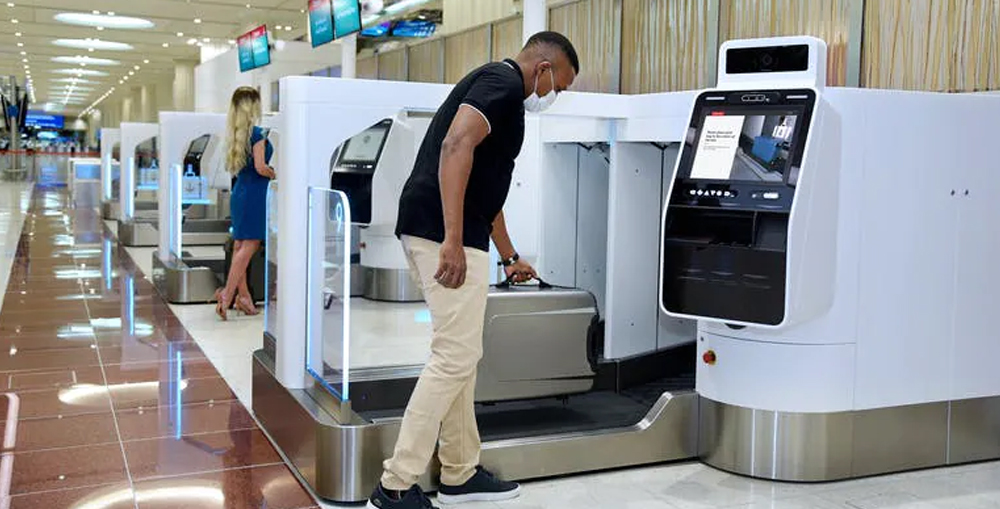
Here is how the digital solutions and technology can help designing the smart airports of the future:
Self-Service Check-In Kiosk
The self-service check-in kiosks are most common siting in international airports these days. The self-service check-in kiosks are also known is self-service boarding kiosks. The main objective of this technology is to enable a completely independent self-service boarding process. The passengers can come to the kiosk, perform the boarding process by themselves and the kiosk prints their boarding passes. The self-service check-in kiosk have a medium sized touch screen display with a simple and easy-to-understand user interface.
The user interface is always designed to support multi-lingual operation. The passengers who comes to the kiosk can scan their booking via a barcode or QR Code scanner. The kiosk can also provide a passport scanner if needed. Then the customers can weigh their luggage and also print out the tags for the luggage. The entire boarding process can be done via the interactive self-service boarding kiosk.
See Also: 5 Future Trends in Self-Check-in Kiosks: What to Expect
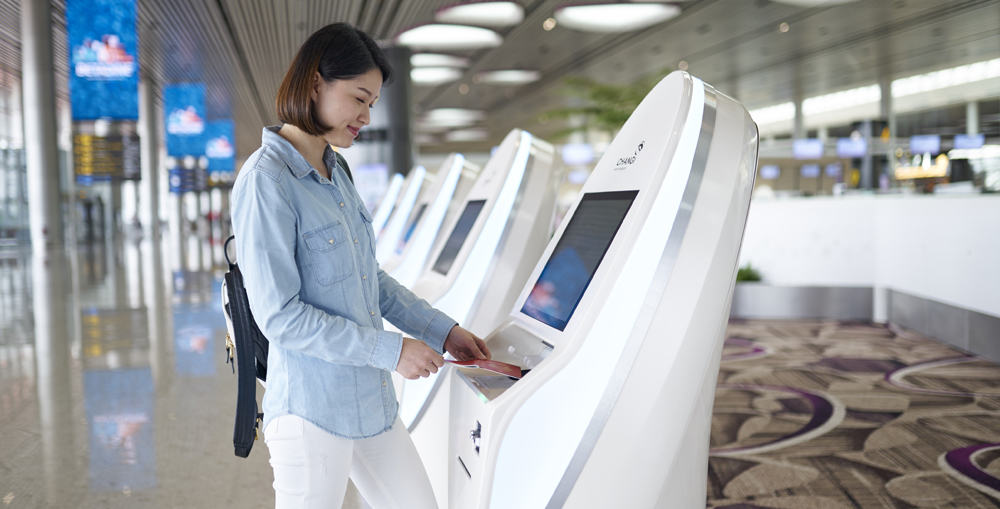
Self-Service Immigration – Smart Gates
The self-service immigration smart gates are being deployed by many top ranked international airports and others are also following. The main concept is to eliminate the long queues and improve the passenger journey. A self-service immigration smart gate can consists of multiple different software and hardware features. For example, some airports are using the facial recognition and some are using the retina scans. The passengers doesn’t have to do anything or stand in any queue, in fact they walk through the gate and the facial recognition and other smart technology based systems identify them and update their immigration database automatically.
There is no need to get stamp on the passport or anything. Everything is fully autonomous and passengers doesn’t have to show their documents or passport or anything at any step of the passenger journey. Some airports are also enabling the self-service contactless immigration via smart identity cards such as Emirate ID card. Whatever the technology is the smart gates can greatly improve the passenger experience.
See Also: Integrating Self-Check-in Kiosks with Mobile Apps: A Seamless Experience
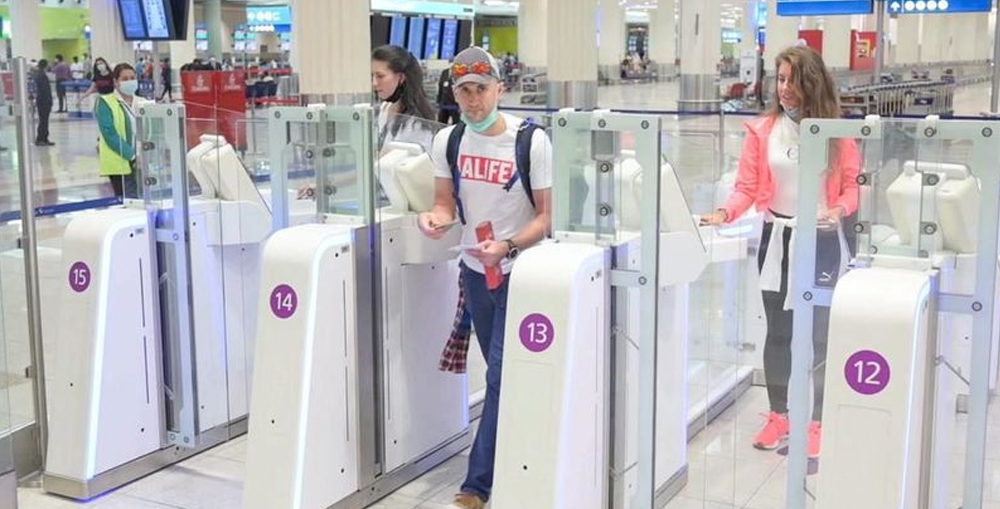
Smart Airports Handle Passengers Smartly
The digitalization have completely transformed a lot of industries. It have completely changed our prospective of a business transaction or service delivery from the past. In fact in the past few years or a decade ago the technology was not so smart, it was not so widely available and the customers or passengers were also not much familiar. But now things have changed, since past two years even more changes have occurred and now a day an ordinary customers is more interested in having a digital interaction and self-service offerings by the businesses. The airports are no different. Passengers who are travelling internationally have more exposure, especially in UAE airports where passengers from all across the world are landing either for transit or for stay in the country.
The airport industry is extremely competitive and the airport operators all over the world are very active in struggle to beat their competition. Where this trend have pushed the airports to test their limits, it have also raised the standards of an ordinary passenger. Every passenger including you and me wants a quicker and smoother experience at the airport, whether it is the destination or a transit everyone wants to complete the processes as quickly as possible. A smart airport implements digital solution that can automatically guide the passengers through the processes and with the help of advanced technologies many service delivery steps can be eliminated which makes the processes quicker and convenient.
See Also: Top 10 Self-Service Technologies for Business in UAE

The latest technology that can connect all the relevant department and provide all the required information to the passenger can really improve the overall operation of the airport. For the passengers who have completed their journey or who are waiting for a connecting flight the process can be digitalized by implementing automatic luggage drop, automatic immigration tunnel or smart gate solution and digital communication channels can be a great help. The security and screening processes can also be digitalized and improved to save time. This enables the airport to quickly take their passengers to the lounge and provide the airport more space for creating more customer experience and service improvements.
Read More: Why Customer Feedback Loop is Important?
Big Data is Making Big Airports More Efficient
Big data is making big airports more efficient! That is true, an ordinary person can’t even imagine how much data has been collected, analyzed and stored at the big airports on daily bases. The Dubai International Airport, DXB is collecting an estimated of 27 Billion electronics facts or readings in just six months of period. This data includes everything such as the passenger count, the queues, the cup of coffee sold, the number of passengers who missed their connecting flights, the time of arrival & departure, the delays, number of devices connected to the WiFi, and everything one can think of.
All the data came from thousands of sensors, systems and input devices with the accuracy as high as it can predict when a luggage bag will arrive at the conveyer belt within a 30 second time window. That magnitude or real-time data with that kind of accuracy has never seen before.
See Also: The Future of Contactless Payments in Kiosk Technology

Artificial Intelligence is Making Smart Airports More Intelligent
The AI or Artificial Intelligence technology is the most advanced and modern digital technology developed ever. The huge data flow and analysis in real time is only possible with the intelligent AI based digital solutions. The job of an AI or Artificial Intelligence at an airport is to analyze the real-time data and interpret it for human and provide the relevant information to the relevant staff in real-time such as for security, for flight control, for logistics, for passenger flow management system and administrators. This makes it possible for the management of some of the world’s largest airport to manage such a huge number of passengers on daily bases.
The machine learning plays a vital role in understanding the patterns, behaviors and help the system to make accurate and precise prediction which aid the management and staff to improve the efficiency. The artificial intelligence and machine learning enabled digital solutions reduce the cost and improve operational efficiency of an airport.
See Also: RSI Mobile Phone Charging Stations – Locker, Kiosk and Signage for Airports
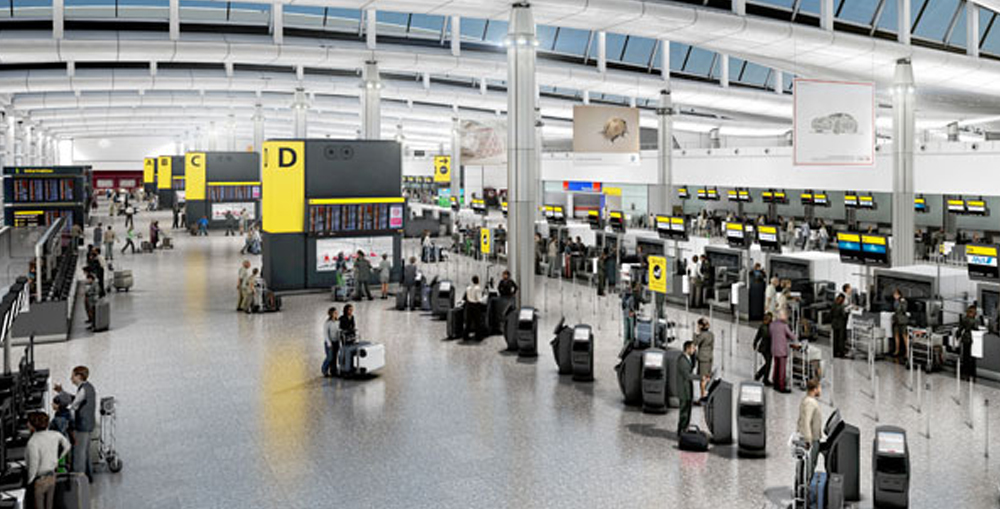
Instant Information Sharing Improve the Efficiency of the Smart Airports
The digital solutions and digital assets help managing the entire operation of the airport with more accuracy and ensure higher punctuality. The real-time information sharing to the airport management, airlines, operators, internal departments, contractors, ground staff, technical teams, flight controllers and everyone else ensures higher punctuality and smooth operation. The future is highly technology driven and the digitalization, integration of artificial intelligence, information management solutions and data will make an airport a smart airport of the future.
The digital assets can easily predict the future requirements of the resources and make it a lot easier for the management to act in time. The digital assets and instant information sharing also help managing the unproductive situation and problems instantly.
See Also: What is a Self Service Kiosk? Here’s All You Need to Know
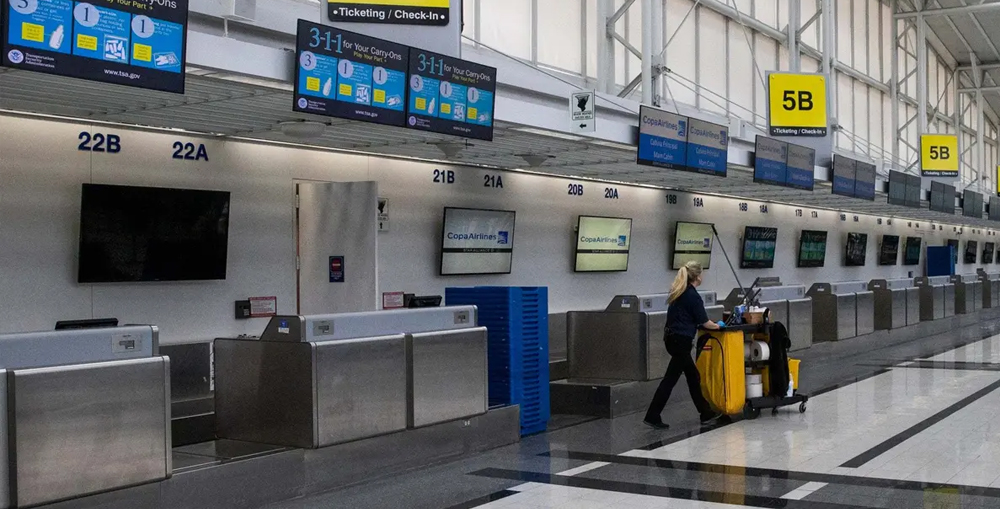
An airport is a very huge and very dynamic environment with a lot many variables which makes it very difficult to predict the future, anything can happen without any notice or prior indicator that can completely disturb the ongoing rhythm of the operation. For such disruptive events an efficient information sharing mechanism can help all the relevant departments and personals to coordinate with each other and get the updates to handle the situation. Such solution are making the smart airports of the future.
Read More: What to Collect and When with a Customer Feedback System?
Digital Solutions Make Smart Airports Secure and Safe
In the modern era of the internet the security, privacy, safety and health concerns are the most important for us all. Passenger who are travelling always think about those things, when they are experiencing any digital interaction the first thing that came into their mind is the security and privacy. Obviously the airports can’t build reputation without assuring all this to the passengers and airlines as well. The smart digital solutions, high-tech safety equipment, sci-fi level of technology equipment to sense and monitor each and every possible hazard.
Highly efficient management and advanced equipment is the necessary of any smart airport of the future. One of the biggest challenge with any airport is the infrastructure, usually the airports have a very unique construction and design. Upgrading the airport’s infrastructure is a very expensive and sensitive matter. So the airport operators take advantage of digital solutions to maximize their capacity while maintaining the excellent levels of operation and service quality.

At airports and other such establishments have thousands upon thousands of passengers on daily bases, which makes it harder to maintain the safety, security and health related concerns. The surveillance system, thousands of sensors, artificial intelligence, big data, machine learning, and capabilities to locate each and every person, luggage and staff makes it easier for the management to maintain highest standards of safety, security, and health and it also increase their capability to deal with unexpected scenarios.
Read More: Self Service Kiosk for Retail Sector
Conclusion
The digital solutions are shaping the way of our life. The rise of the internet and smart devices have made us more technology dependent than ever before. People are getting more comfortable with the digital experience rather traditional human to human interaction. The airports are no exception. The smart airports of the future must have technology driven digital solutions and systems in place such as contactless immigration tunnels with facial recognition capabilities, smart gates, self-service boarding kiosk, digital interaction, big data, artificial intelligence, machine learning, security and safety solutions, information sharing systems and such digital solutions are driving the aviation industry into the future.
RSI Concepts is a leading name in the digital transformation and customized solutions, if you need any help or want to learn more about the subject, feel free to reach us through our Contact Us page or leave a comment in the comment box below and we will get in touch with you soon.
See Also: How Facial Recognition Technology and Interactive Kiosks Improve Security?
